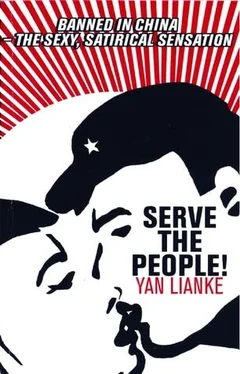Once his heartbeat had slowed again, a new, solemn self-possession descended on him. He fixed his gaze on an old-fashioned carved door to his left. Striding over to it, he raised his shoulders and straightened his spine-precisely as any rank-andfile soldier who found himself in the doorway to his Division Commander's office should tilted his head back, thrust both chest and eyes forward and barked out six over-enunciated syllables: `Reporting for Duty.'
He was greeted by silence.
Bracing his vocal chords, he barked out a second time: `Reporting for Duty.'
Silence, like the twilight, continued to wash through the house.
He knew that the Commander and his wife slept in the bedroom in front of him. While working outside, he'd often seen her face at the window, her youthful, aristocratically pallid features poised there, as if frozen within an antique picture frame. Just as the Revolution itself advanced in lopsided paces now slow, now fast, now inching, now striding-her imprisoned face was sometimes impassive, sometimes animated.
She had to be in there. He'd never known her to call at other houses in the compound, at the homes of the Political Commissar or Deputy Division Commander, or pass the time with their wives. She hardly ever spoke to them, just as the Division Commander hardly ever wasted idle words on his subordinates. This bedroom was the nucleus of her existence, the building around it her whole life. He knew she was in the bedroom and, as he considered trying another `Reporting for Duty', he instead found himself knocking-twice-on the door. His knuckles rapped against the wood, as on the surface of a drum.
`Come in,' she replied at last. Her voice, low and hoarse, had a narrow tremble to it, as if something a slight, yielding obstacle — were lodged in her throat.
He pushed the door open. Only then did he see that the light was off, that the room was cast in shadows, the bed, table and chairs melting into partial obscurity. She was seated on the edge of the bed, a book in hand-volume I of The Selected Work, ofzao Zeaonzq. Later, much later, as he cast his mind back over a memory that had sweetened with age, it would dawn on him that it had been far too dark to read, that she had only been holding the book for show. But at that moment as it was happeninghe had believed she truly was reading, just as he had believed everything else that happened had followed on as naturally and spontaneously as rain falling from an overcast sky, or the sun emerging into a blue one.
'Aunt Liu,' he said, 'what can I do foryou?'
'The light cord is stuck,' she replied. 'Would you get it back down for me?'
Following her gaze, he saw that the cord for the light over the bedside table had wrapped itself around its discoloured fitting, and he would need to stand on something to untangle it. So he walked over to her side of the bed, pulled out the chair from under the bedside table, took the woven cane mat off it, removed his shoes, brushed the soles of his feet-which were, as it happened, not in the slightest bit dirty-and laid an old newspaper out on the chair. He then stepped onto it, unwound the cord and while he was up there, gave it a tug.
The room was flooded with light.
Against the sudden electric brightness of the interior, the window shone dark, and threadlike cracks crept, exposed, across the plaster walls. Like an armoury bereft of exciting, new-issue weapons, the room held no surprises: a portrait of Chairman Mao and a framed print of his quotations hung on the wall, while a plaster bust of the Great Helmsman kept watch over the writing desk. A large mirror-its upper edge inscribed with the Chairman's key imperatives-rested next to a washbowl; to one side hung the Division Commander's telescope, to the other the 54-revolver he rarely wore, its leather holster gleaming dark burgundy. Directly beneath the mirror was a dressing table, its glassy green surface covered with jars of face cream, pots of face powder, scissors, combs and other such objectsluxuries you didn't often see in those days.
None of this, however, confounded Wu Dawang's expectations. Though he'd never before seen the first floor of the Division Commander's house, he had been upstairs in the residence of the Political Commissar and his wife-who worked in the division's accounts office. Their home (another two-storey, Soviet-style construction) was exactly the same as the Commander's: simple, modest, every surface inspirationally resplendent with the glorious traditions of the Revolution. It roused, urged, all visiting subordinates to the most exalted, the most revolutionary homages they could muster-to recount to anyone who would listen the revolutionary past and present of their senior officers, to worship them as idols of political correctness, as lustrous reflections of their glorious Party, as proof positive of the astonishing fortune and honour that had fallen into their laps, permitting them to become soldiers in such a miraculous era.
Wu Dawang was overwhelmed by the hidden, abysslike reservoirs of simplicity lurking upstairs in the Commander's home. As he jumped back down off the chair, he searched for a sentence that would express to Liu Lian his sense of awed respect. He thought of the phrases that rang out most often during New Year house visits in his village: the simplest homes are the most glorious, the most glorious are the most revolutionary; take pride in the traditions of the Revolution, struggle for glory. And so on and so forth. A number of salutations from his military education classes also sprang to mind. For example, the power of tradition can transcend the passage of time to shape our tomorrows. Or, the simplest things are always the most moving, the most moving things are always the simplest. Or (as his Political Instructor had once read out from an editorial), if our leaders can inherit and disseminate the Yan'an Spirit, can embody and pass on the simple virtues of our illustrious Party leadership, our revolutionary endeavours will glow red like the sun, bringing radiant hope wherever they shine.
Intensely moved by the wealth of beauteous expressions that had come so readily to him, he was on the verge of blurting out a few when suddenly he thought better of it. He began to feel that, however impressive they looked written down, if you actually spoke them out loud, they might sound a little indi gestible, a little off, like undercooked rice, or sour soup. You might even sound like you were a bit, well, not all there-not quite right in the head. Especially as this was his first time upstairs, the first time he'd been moved by the Yan'an Spirit in Liu Lian's bedroom, the first time he'd wanted to express his admiration to her, he didn't want to regurgitate the pompous formulations found in essays. He wanted to come out with some priceless gems of his own, with the simplest, purest, most moving words he could find.
But the moment he left those fine, worn phrases back where they belonged-in the posters, newspapers, books and deafeningly public broadcasts that were their natural habitat his head became a vast, echoing cavern, a colossally deserted public square, rudely stripped of its festoons. His face throbbed bright red under the pressure of this inarticulacy, his lips trembling beneath the anxious weight of everything he had on the tip of his tongue but was unable to verbalize.
After removing the newspaper, he put the chair neatly back under the table, replaced his shoes and straightened up, nervous sweat pouring off his face like water from a spring. He listened to the drops hitting the ground, one after another, like rainwater falling from the eaves of a house onto tiled ground below. Finally he managed to garble: Is that all, Aunt Liu? If so, I'll be off downstairs.'
`Don't call me Aunt,' she said, sounding irked. It makes me sound so old.'
Smiling brightly, he meant to risk looking at her but instead heard himself saying: `Aunt sounds more — more personal.'
Читать дальше












